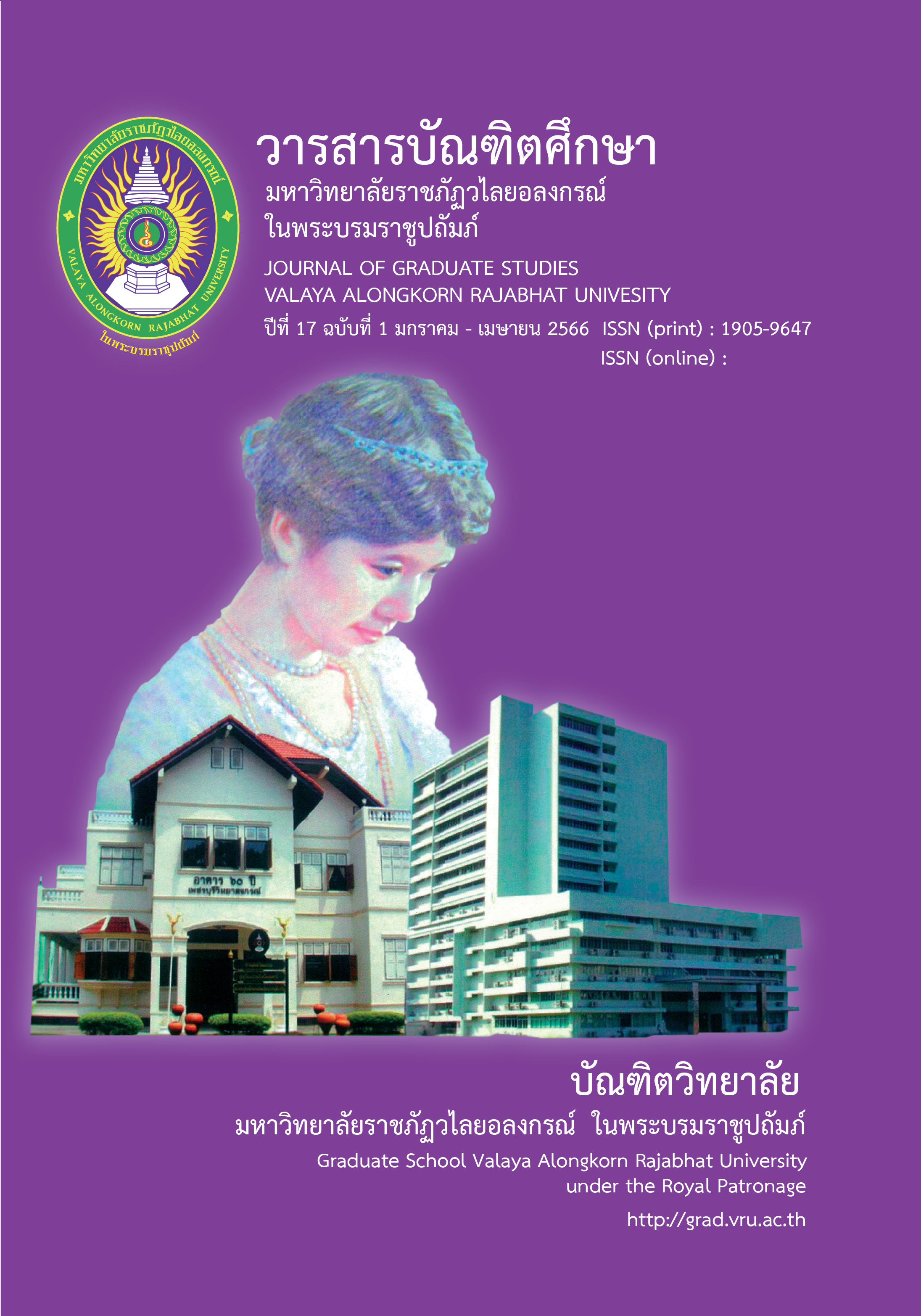PERCEIVED ORGANIZATIONAL SUPPORT, WORK-LIFE BALANCE, WORK ENGAGEMENT AND SUBJECTIVE WELL-BEING OF AREA EMPLOYEES OF A COMMERCIAL BANK
Main Article Content
Abstract
The objectives of this research were to study: 1) the relationship between perceived organizational support, work-life balance, and work engagement and subjective well-being of area employees of a commercial bank, and 2) the factors could predict subjective well-being of area employees of a commercial bank. The sample of this study was 210 area employees of a commercial bank. The research instruments were questionnaires on perceived organizational support, work-life balance, and work engagement and subjective well-being and statistics used were descriptive statistics, Pearson’s product moment correlation efficient, and stepwise multiple regression analysis.
Results showed that: 1) perceived organizational support, work-life balance, and work engagement were positively correlated with subjective well-being of area employees of a commercial bank; and 2) work engagement (absorption) and work-life balance (time) could predicted subjective well-being of area employees of a commercial bank at .01 level with a predictive power of 73.9%.
Article Details

This work is licensed under a Creative Commons Attribution-NonCommercial-NoDerivatives 4.0 International License.
บทความทุกเรื่องได้รับการตรวจความถูกต้องทางวิชาการโดยผู้ทรงคุณวุฒิ ทรรศนะและข้อคิดเห็นในบทความ Journal of Global of Perspectives in Humanities and Social Sciences (J-GPHSS) มิใช่เป็นทรรศนะและความคิดของผู้จัดทำจึงมิใช่ความรับผิดชอบของบัณฑิตวิทยาลัย มหาวิทยาลัยราชภัฏวไลยอลงกรณ์ ในพระบรมราชูปถัมภ์ กองบรรณาธิการไม่สงวนสิทธิ์การคัดลอก แต่ให้อ้างอิงแหล่งที่มา
References
Bakker, A. B. & Demerouti, E. (2008). Towards a model of work engagement. Career Development International. 13(3), 209-223.
Bakker, A. B., Schaufeli, W. B., Leiter, M. P., & Taris, T. W. (2008). Work engagement: an emerging concept in occupational health psychology. Work and Stress. 22(3), 187-200.
Bank of Thailand. (2015). rāingān sētthakit kānkhā læ kānlongthun nai klum prathēt CLMV pī 2557 [CLMV trade and investment report 2014]. Retrieved from https://www.bot.or.th/Thai/MonetaryPolicy/EconMakhongCanelArea/NeighborReportCLMV/Doclib_CLMVReport/CLMV_Report_2014.pdf
Bryson, A., Forth, J., & Stokes, L. (2017). Does employees’ subjective well-being affect workplace performance? Human Relations. 70(8), 1017-1037.
Demerouti, E., Bakker, A. B., De Jonge, J., & Janssen, P. P. M. (2001). Burnout and engagement at work as function of demand and control. Scandinavian Journal of Work, Environment and Health. 27, 279-286.
Dex, S. & Bond, S. (2005). Measuring work-life balance and its covariates. Work Employment Society. 19, 627-636.
Diener, E. (2009). The Science of Well-Being: The Collected Works of Ed Diener. New York: Springer Verlag.
Diener, E., Suh, E. M., Lucas, R. E., & Smith, H. L. (1999). Subjective well-being: Three decades of progress. Psychological Bulletin. 125, 276-362.
Eisenberger, R., Huntington, R., Hutchison, S., & Sowa, D. (1986). Perceived organizational support. Journal of Applied Psychology. 71(3), 500-507.
Greenhaus, J. H., Collins, K. M., & Shaw, J. D. (2003). The relation between work family balance and quality of life. Journal of Vocational Behavior. 63, 510-531.
Gropel, P. & Kuhl, J. (2009). Work–life balance and subjective well-being: The mediating role of need fulfilment. British Journal of Psychology. 100, 365–375.
Harter, J. K., Schmidt, F., & Hayes, T. (2002). Business-unit level relationship between employee satisfaction, employee engagement, and business outcomes: A meta-analysis. Journal of Applied Psychology. 87, 268-279.
Kitreerautiwong, N. & Tetjativaddhana, P. (2013). khwām trong læ khwāmchư̄aman khō̜ng bǣpsō̜pthām pramœ̄n prasopkān kāndūlǣtō̜nư̄ang samrap phūpūai baowān chanit thīsō̜ng chabap phāsāThai [Validity and Reliability of the Thai Version of the Experienced Continuity of Care for Diabetes Mellitus (ECC-DM) Questionnaire]. The Public Health Journal of Burapha University. 8(1), 13-25.
Kowalski, T. & Loretto, W. (2017). Well-being and HRM in the changing workplace. The International Journal of Human Resource Management. 28(16), 2229-2255.
Koyuncu, M., Burke, R. J., & Fiksenbaum, L. (2006). Work engagement among women managers and professionals in a Turkish bank: Potential antecedents and consequences. Equal Opportunities International. 25, 299–310.
Krejcie, R. V. & Morgan, D. W. (1970). Determining sample for search activities. Educational and Psychological Measurement. 30(3), 607-610.
Mathebela, M. (2013). Subjective Well-being, Engagement and Support in the Workplace. (master’s thesis). Johannesburg. University of Johannesburg. Retrieved from http://hdl.handle.net/10210/8716.
Mello, J. A. (2015). Strategic Human Resource Management. 4th ed. Singapore: Cengage Learning.
Panaccio, A. & Vandenberghe, C. (2009). Perceived organizational support, organizational commitment and psychological well-being: A longitudinal study. Journal of Vocational Behavior. 75, 224-236.
Peccei, R. & Van De Voorde, K. (2019). Human resource management-well-being-performance research revisited: Past, present, and future. Human Resource Management Journal. 29(4), 539-563.
Rashid, W. E. W., Nordin, M. S., Omar, A., & Ismail, I. (2011). Evaluating social support, work-family enrichment and life satisfaction among nurses in Malaysia. International Conference on Management and Service Science. 8, 150-154.
Rhoades, L. & Eisenberger, R. (2002). Perceived organizational support: A review of the literature. Journal of Applied Psychology. 87, 698-714.
Roemer, A. & Harris, C. (2018). Perceived Organizational Support and Well-being: The Role of Psychological Capital as a Mediator. SA Journal of Industrial Psychology. 44(2), 1-11. https://doi.org/10.4102/sajip.v44i0.1539
Saks, A. M. (2006). Antecedent and consequence of employee engagement. Journal of Managerial Psychology. 21, 600-619.
Schaufeli, W. B. & Bakker, A. B. (2003). Utrecht Work Engagement Scale. Utrecht: Utrecht University Press.
Schaufeli, W. B. & Bakker, A. B. (2010). The conceptualization and measurement of work engagement: A review. In A.B. Bakker and M.P. Leiter. (Eds.). Work Engagement: A Handbook of Essential Theory and Research (pp. 10-24). New York: Psychology Press.
Schaufeli, W. B., Salanova, M., González-romá, V., & Bakker, A. B. (2002). The measurement of engagement and burnout: A two sample confirmatory factor analytic approach. Journal of Happiness Studies. 3, 71-92.
Shimazu, A. & Schaufeli, W. B. (2009). Is workaholism good or bad for employee well-being? The distinctiveness of workaholism and work engagement among Japanese employees. Industrial Health. 47(5), 495-502.
Snell, S. A. & Bohlander, G. W. (2007). Human Resource Management. Ohio: Thomson.
Srisatidnarakul, B. (2012). kānphatthanālæ trūat sō̜p khunnaphāp khrư̄angmư̄ wičhai: khunnasombat kān wat chœ̄ng čhittawitthayā [Development and validation of research instruments: paychometric properties]. Bangkok: Chulalongkorn University Printing House.


